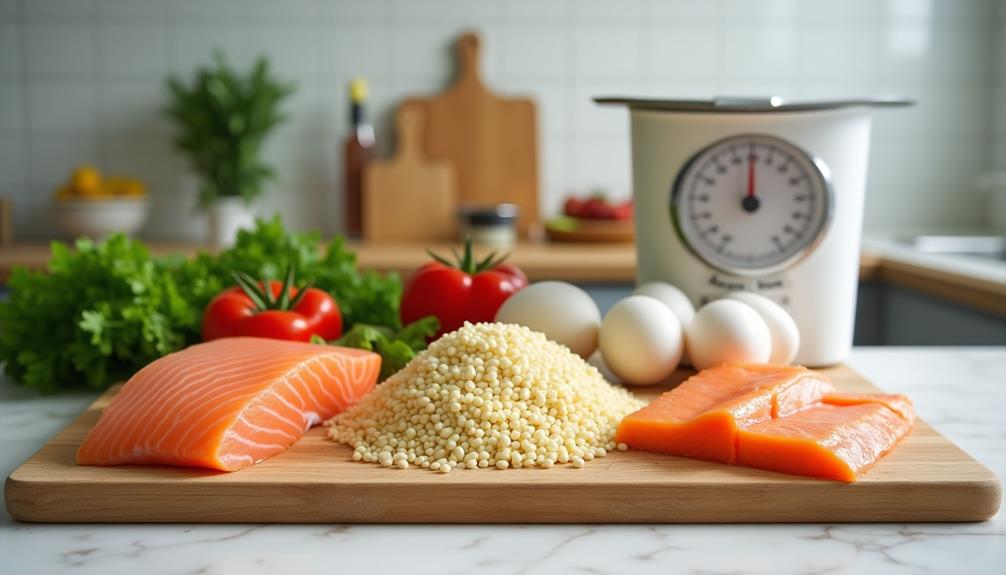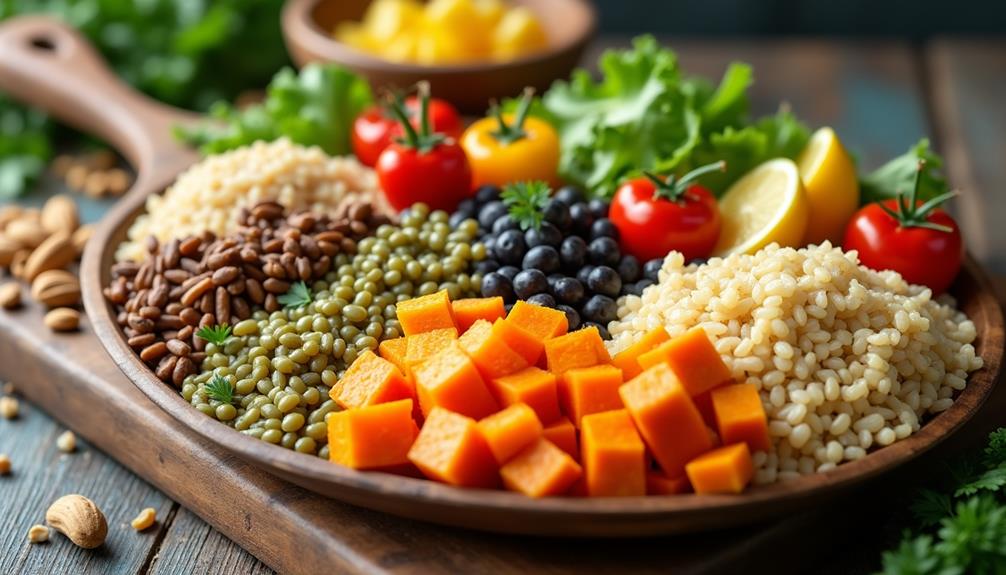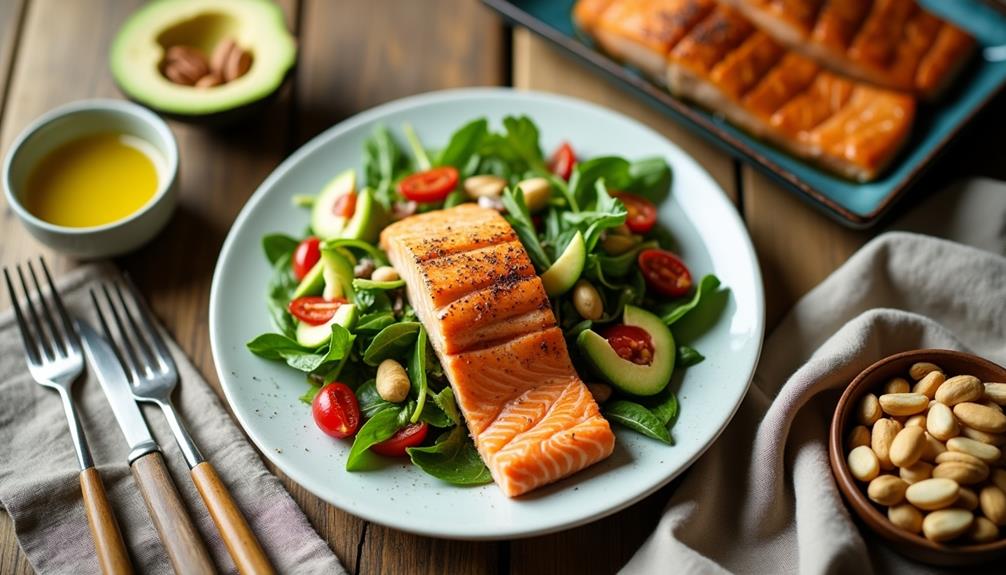To build a lean muscle gain diet plan, start by understanding macronutrients: prioritize proteins, healthy carbs, and fats. Calculate your caloric needs using your Basal Metabolic Rate and activity level. Select quality protein sources like chicken or legumes, and choose whole grains and fruits for your carbs. Don't forget healthy fats from avocados and nuts, which support hormone production. Consider meal timing: consume fast-acting carbs post-workout for energy replenishment. Create a sample meal plan to guide your daily intake, and remember to monitor and adjust as needed for your unique goals. You'll discover more effective strategies along the way.
Core Insights
- Calculate your Total Daily Energy Expenditure (TDEE) and add a caloric surplus of 250-500 calories for muscle gain.
- Prioritize high-quality protein sources, such as lean meats, dairy, and plant-based options, to support muscle repair and growth.
- Incorporate healthy carbohydrates from whole grains, fruits, and vegetables to provide energy for workouts and recovery.
- Include essential fats from sources like avocados, nuts, and fatty fish to support hormone production and overall health.
- Track your food intake and adjust portion sizes to meet your individual caloric and macronutrient needs effectively.
Understand Macronutrients

Understanding macronutrients is crucial for anyone looking to build lean muscle effectively. Macronutrients consist of proteins, carbohydrates, and fats, each playing an essential role in your diet.
Proteins are vital because they repair and build muscle tissue. Aim for lean sources like chicken, fish, and legumes. When considering protein supplementation, high-quality whey protein powders can provide 20-30g of protein per serving, supporting muscle growth and recovery. Carbohydrates provide the energy you need for workouts, so focus on whole grains, fruits, and vegetables. Fats, while often misunderstood, are necessary for hormone production and overall health; prioritize healthy fats from sources like avocados and nuts.
Balancing these macronutrients is crucial to fueling your body and supporting muscle growth. By understanding their roles, you can make informed choices that align with your fitness goals, setting a solid foundation for your lean muscle gain journey.
Calculate Your Caloric Needs

Calculating your caloric needs is a crucial step in creating an effective diet plan for lean muscle gain. To start, ascertain your Basal Metabolic Rate (BMR), which is the number of calories your body needs at rest. You can use online calculators for this. Next, factor in your activity level to find your Total Daily Energy Expenditure (TDEE). This includes calories burned through exercise and daily activities. Once you've determined your caloric needs, consider incorporating fast-acting carbohydrates into your post-workout routine to replenish energy stores and support muscle recovery.
To build muscle, aim for a caloric surplus—typically 250 to 500 calories above your TDEE. Keep in mind that individual needs can vary, so monitor your progress and adjust as necessary. Tracking your intake can help guarantee you're on the right path to achieving your lean muscle gain goals.
Choose Protein Sources

Choosing the right protein sources is crucial for building lean muscle effectively. High-quality protein aids in the repair and growth of muscle tissue after workouts. Focus on lean meats such as chicken, turkey, and fish. These choices are packed with protein and low in unhealthy fats. For those seeking alternatives, grass-fed whey protein can be an excellent supplement, offering top-quality protein with additional nutritional benefits like omega-3s and CLA.
Plant-based proteins, like beans, lentils, and quinoa, are also excellent options. They provide essential amino acids while being abundant in fiber and nutrients. Don't overlook dairy products like Greek yogurt and cottage cheese, which are superb for muscle recovery.
Incorporate protein into every meal and snack to support muscle growth. Aim for a variety of sources to ensure you're receiving a well-rounded intake of nutrients. Balance is key for optimal outcomes in your lean muscle gain journey.
Select Healthy Carbohydrates

Fuel your muscle-building efforts by selecting healthy carbohydrates that provide sustained energy for your workouts and recovery. Focus on whole grains like brown rice, quinoa, and oats. These options are rich in fiber, which helps maintain steady energy levels.
Fruits and vegetables are also excellent choices. They not only offer carbohydrates but also essential vitamins and minerals. Opt for starchy vegetables like sweet potatoes and squash to boost your nutrient intake.
Avoid refined carbs such as white bread and sugary snacks, as they can lead to energy crashes. Instead, aim for a balanced plate that includes healthy carbs, ensuring you're primed for performance. By making these selections, you'll support your muscle gain goals effectively.
Include Essential Fats

Incorporating essential fats into your diet is necessary for supporting muscle growth and overall health. Healthy fats play an important role in hormone production, including testosterone, which is significant for muscle development. Aim to include sources like avocados, nuts, seeds, and olive oil in your meals. These fats provide energy and help with nutrient absorption.
Don't shy away from fatty fish like salmon, which are rich in omega-3 fatty acids. These healthy fats can reduce inflammation and promote recovery after workouts.
Plan Meal Timing

Meal timing can greatly influence your muscle gain progress. To optimize your results, focus on nutrient timing around your workouts. Consuming protein and carbohydrates before and after exercise can enhance recovery and muscle synthesis. Aim for a balanced intake throughout the day to maintain energy levels.
Here's a simple table to help you understand meal timing:
| Meal Type | Timing | Purpose |
|---|---|---|
| Pre-Workout | 30-60 minutes before | Fuel for your workout |
| Post-Workout | Within 30 minutes | Muscle recovery and growth |
| Throughout Day | Every 3-4 hours | Sustained energy and metabolism |
| Before Bed | 30-60 minutes before | Overnight muscle repair |
Create a Sample Meal Plan

To maximize muscle gain, it's important to have a well-structured meal plan that aligns with your fitness goals. Start with breakfast: include scrambled eggs, whole grain toast, and a piece of fruit. For a mid-morning snack, try Greek yogurt with berries. At lunch, choose grilled chicken, quinoa, and steamed broccoli. Don't skip your afternoon snack; a handful of almonds or a protein shake works well. Dinner should feature lean steak, sweet potatoes, and a mixed green salad. Before bed, consider a casein protein shake to aid overnight recovery. This sample meal plan provides balanced nutrients to fuel your workouts and support muscle growth. Adjust portion sizes based on your specific caloric needs and activity level for best results.
Monitor and Adjust Your Diet

As you progress in your muscle gain journey, regularly monitoring and adjusting your diet becomes essential for continued success. Start by tracking your daily caloric intake and macronutrient ratios. Use a food diary or an app to simplify this process.
Next, assess your progress every few weeks. Are you gaining muscle? If not, consider increasing your caloric intake slightly.
On the flip side, if you're gaining excess fat, you might need to reduce calories.
Also, pay attention to how your body feels. Adjust portion sizes or food choices based on energy levels and performance in the gym.
Frequently Asked Questions
How Do Supplements Fit Into a Lean Muscle Gain Diet?
Supplements can enhance your lean muscle gain by filling nutritional gaps, boosting protein intake, and supporting recovery. They're not a substitute for whole foods, but they can complement your diet effectively when used wisely.
Can I Build Muscle on a Vegetarian or Vegan Diet?
Absolutely, you can build muscle on a vegetarian or vegan diet! With the right balance of proteins, carbs, and healthy fats, you'll feel like a muscle-building superhero while nourishing your body with plant-based goodness.
What Role Does Hydration Play in Muscle Gain?
Hydration is essential for muscle gain. It helps transport nutrients, maintain performance, and prevent fatigue. When you're well-hydrated, your muscles recover faster, allowing you to train harder and achieve better results in your fitness journey.
How Can I Track My Macronutrient Intake Effectively?
To track your macronutrient intake effectively, use a food diary or apps that log meals. Measure portions accurately, read nutrition labels, and adjust as needed to meet your specific fitness goals. Stay consistent!
What Are the Signs of Overtraining While Following This Diet?
You might feel like a wilted plant, struggling to thrive. Signs of overtraining include persistent fatigue, decreased performance, irritability, and increased injuries. Listen to your body; rest is essential for growth and recovery.

